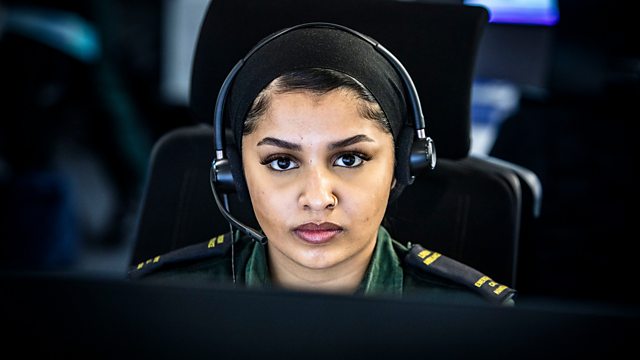
In south west London, Martin attends a child hit by a car, while dispatchers Ed and Webster work tirelessly to get ambulances to patients as hospitals reach full capacity.
Rising pressure on the NHS impacts local A&Es, with Croydon and St George's hospitals reaching capacity. As a result, control room dispatchers Ed and Webster have fewer resources to send out to the growing number of patients waiting. Meanwhile, in Wimbledon, paramedic Martin does his best to care for as many patients as he can.
We join call handlers answering a 999 call from a distressed mother after her baby accidentally poured boiling tea over himself. As mum tries to give first aid to the baby, the phone is passed to the caller’s eight-year-old daughter, who listens to the advice given by the call handler, while doing her best to provide as much detail as possible to help the ambulance that has been dispatched to the family.
Also on shift is advanced paramedic Andy. One of four critical care resources available to care for the whole of London, he is dispatched to a category 1 call – the highest priority – for an 86-year-old patient trapped under a car. Andy finds the patient on the ground with a cut to her head. While assessing the patient’s injuries, she explains how she was on her way to the hairdressers when she was knocked down.
Supporting the ambulance crews on shift across Wimbledon and Croydon, dispatchers Webster and Ed are feeling the impact of hospital delays on their patch. While ambulances are stuck at hospital waiting to hand over, calls continue to come in, which means more patients in need of an urgent ambulance are kept waiting, but there are no resources available to send to them.
After waiting an hour to hand over a patient at hospital, paramedic Lydia finally becomes available and is immediately dispatched to a 35-year-old man who is feeling suicidal and has already been kept waiting two and a half hours for an ambulance. Lydia takes the time to listen to the patient, who tells her he has become overwhelmed by fatherhood and the pressures of supporting his young family.
At the end of the school day, the fast response car, driven by paramedic Martin, is urgently dispatched to a three-year-old who has been hit by a vehicle outside a primary school. The child has thankfully walked away unscathed. In the back of the ambulance, the crews delight in his cheeky smile and his dream of growing up to become Spider-Man. As a father himself, Martin reflects: "When I was growing up, it was all about being able to go out, play in the park after school until it went dark, walk yourself home. From a parent’s perspective now, I don’t want to take that risk now with my daughter."
A parent’s worst fear becomes reality as a call comes in revealing a 13-year-old has been stabbed on the way home from school. Advanced paramedic Andy joins the police at the scene. The job hits home to the team in control, who despite seeing jobs like this too regularly are deeply moved by the child’s plight.
A new day begins with extreme hospital delays being felt across south west London. Ninety-seven crews transport patients to A&E in just the first two hours of the shift. This leaves a patient giving birth in an Uber. Meanwhile, Croydon Hospital has reached capacity and requests the majority of emergencies be diverted away from the hospital to allow time to free up beds. Crews across the area become frustrated as they’re expected to travel further away to neighbouring hospitals with very sick patients. Dispatcher Webster, who is originally from New York, reflects on the different characteristics of the two healthcare systems.
Across the afternoon, the pressure continues to build as another hospital declares a blue-light divert. Fast response paramedic Martin is dispatched to a call for a 63-year-old patient with an abnormal heart rate of 224 beats per minute. The patient needs further treatment at hospital, and as they wait for the ambulance crew to help back them up, the patient’s grandchild offers help to Martin. It’s a heartwarming end to a challenging shift, and he reflects: "When I think about my daughter and what I’d like for her when she grows up in this crazy city. She needs to be resilient. She needs to know how to keep herself safe. But also to enjoy life. London can be a scary place, but underneath it all, there’s quite a bit of hope and light."
From traumatic incidents involving children to mental health crises, this episode explores the growing disconnect between demand and available care as we see the NHS dealing with crippling pressures and paramedics on the ground reflecting on how to raise children in an unpredictable and sometimes troubled city.
On TV
More episodes
Previous
Next
You are at the last episode
Credits
| Role | Contributor |
|---|---|
| Narrator | Christopher Eccleston |
| Executive Producer | Simon Ford |
| Executive Producer | Lucy Morgan |
| Series Producer | Tasha McLintock |
| Series Editor | James Robinson |
| Director | Aodh Breathnach |
| Production Company | Dragonfly Film and Television |
Broadcast
- Next Thursday 21:00
